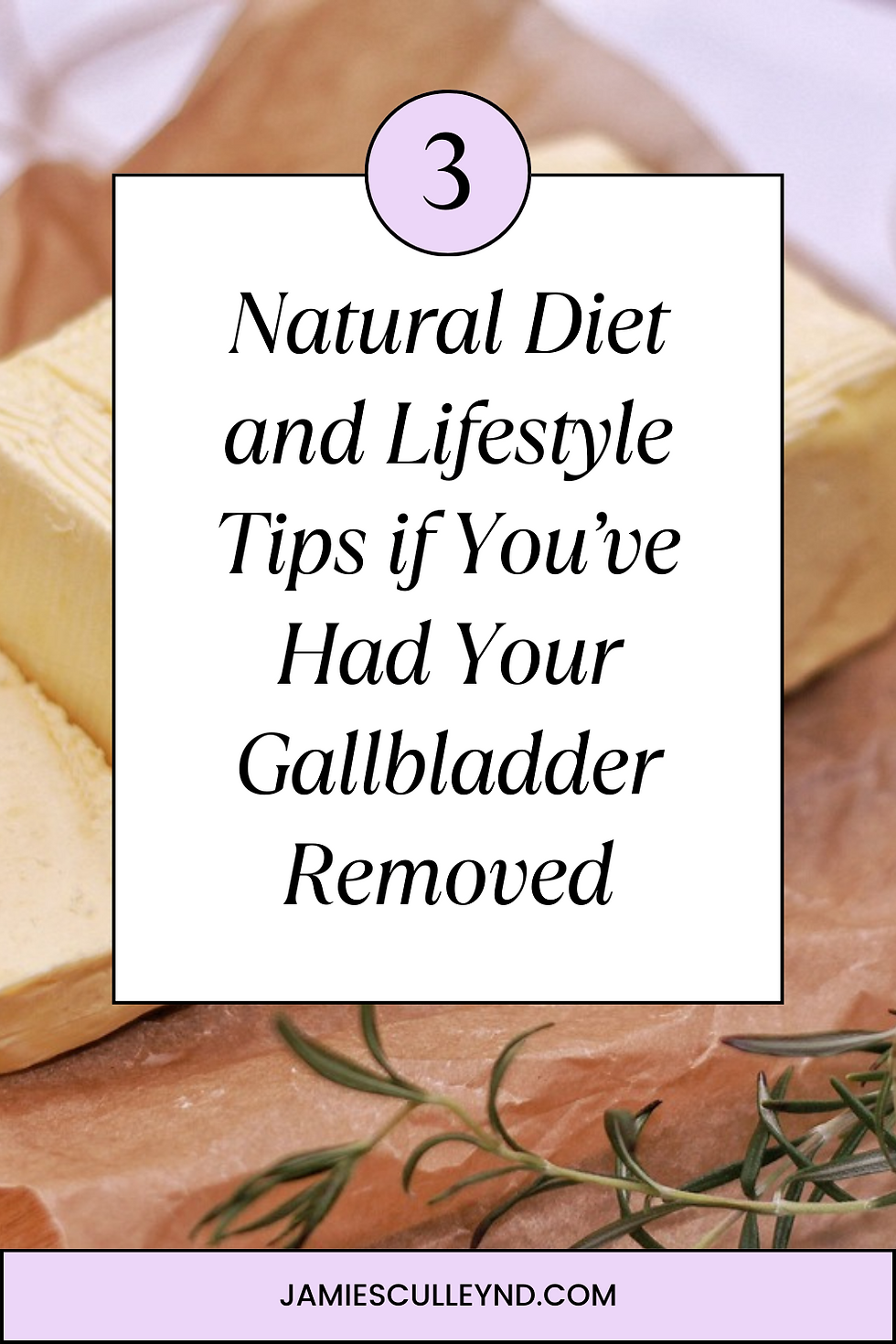Natural Diet and Lifestyle Tips if You’ve Had Your Gallbladder Removed
- Jamie Sculley, ND

- Sep 20, 2023
- 4 min read
Updated: Nov 30, 2023

"Do you have your gallbladder?" is a question I ask new patients especially if they're having digestive issues. The gallbladder isn't essential but it does an important job when it comes to breaking down our food. Getting your gallbladder out is called a cholecystectomy and it's a pretty common procedure.
I saw a patient who had been experiencing some really uncomfortable symptoms since getting hers taken out. Her doctors weren't taking her concerns seriously, were labeling her symptoms as "anxiety" and even took her off the only medication that was helping her feel better. Discussing stress management tips and supplementing digestive support helped along with providing reassurance that her concerns were valid.
There are genuine reasons to go through this procedure, but I want to give you the information that you can use to make an informed decision. If you've had yours taken out and have been experiencing digestive issues, you're not alone. Your concerns are real.
What Is the Gallbladder and What Does It Do?
Our gallbladder is a small pouch in the upper right abdomen below the liver that stores and releases bile when we need to digest fat. The liver makes bile and stores it in the gallbladder until the small intestines signal the gallbladder to release it.
Bile contains cholesterol, bile salts, bilirubin, and water. If the composition of bile gets too "sticky" it can stick to the gallbladder walls or form gallstones. When the stones get into the surrounding ducts they can cause the ducts to spasm. This can be felt as cramping pain in the upper right abdomen that may radiate to the side or back. Discomfort may be accompanied by indigestion, nausea or vomiting especially after eating fatty foods. If the ducts become blocked by stones this can lead to severe pain, fever, or pancreatitis.
Do We Need Our Gallbladder?
Yes and no. It depends on how well it's functioning and whether it's causing discomfort or other more serious symptoms. It's an important organ for fat digestion, but we can get by without it. Even when it's not there the liver continues to produce and release bile.
Reasons to Get the Gallbladder Removed
If gallstones are present, they can cause some potentially serious complications in the gallbladder, liver and pancreas. Complications can include gallbladder perforation, jaundice, pancreatitis, infection, and abscess. Another reason to get it taken out is if the pain is too severe or not responding to treatment.
What if I’ve Already Had My Gallbladder Removed?
Getting your gallbladder removed may not resolve your symptoms. There are a couple possible side effects of having it removed that I think people should be aware of if they're making an informed decision to have it removed.
Post cholecystectomy syndrome - this can include vague digestive symptoms, indigestion, pain and gas. Without the gallbladder there to store the bile, it can irritate the stomach and cause heartburn and reflux.
Dumping syndrome - diarrhea happens either immediately or about 2 hours after eating. The thought is that bile gets released into the small intestine and acts as a laxative. Increasing fiber in the diet, eating a low fat diet, and using enzymes with meals may help.
Tips if You’re Experiencing These Syndromes:
If you’re experiencing reflux, doing a trial of a prescription called cholestyramine can help determine if the issue is being caused by bile. This medication can have long term effects on fat and fat soluble vitamin absorption. If it works, you could try soluble fiber, pectin or charcoal to “soak up” the bile instead.
Digestive aids like ox bile, bitters, hydrochloric acid (HCl), digestive enzymes, and pancreatin may help when taken before a meal.
If there’s diarrhea, fiber like chia seeds, flax or fiber capsules/powder may help.
How to Keep the Gallbladder Healthy
If you don't have any reason to get your gallbladder removed there are diet and lifestyle changes you can make to keep your gallbladder healthy or even relieve gallbladder inflammation.
Eating a healthy diet with fruits, veggies and good quality animal protein
Having a low intake of fatty foods
Exercising regularly
Including digestive bitters in your diet like greens, ginger, mint, citrus, coffee and beer. You can also buy tinctures of pre-made bitters like Swedish Bitters.
Take digestive enzymes or ox bile with meals to aid digestion and breakdown of food
I do not recommend doing "gallbladder flushes" with olive oil. The "stones" that might come out are oil, not gallstones. This home remedy might also be risky if you already have gallbladder issues as it may increase the activity of the gallbladder and cause pain, nausea, vomiting or diarrhea.
If you liked this post and found it helpful I'd love to know! Share this post with anyone who might like to read it!
Please subscribe to my site if you'd like to be notified about updates and blog posts or follow me on Facebook and Instagram!
If you'd like to work with me please take a look around my website for more information about my services and health programs.
In health,
Dr. Jamie
This website is not intended for the purpose of providing medical advice. All information, content, and material of this website is for informational purposes only and are not intended to serve as a substitute for the consultation, diagnosis, and/or medical treatment of a qualified physician or healthcare provider.
#naturopathic #naturopathicdoctor #naturopathicmedicine #holistic #functionalmedicine #naturalhealthconsultant #holisticdoctor #alternativemedicine #homeopath #homeopathic #naturopath #wholistic #naturaldoctor #naturalmedicine




Comments